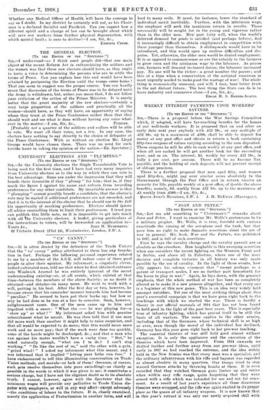" CA' CANNY."
[To THE EDITOR OF THE " SPECTATOR."] Sta.—It is often denied by the defenders of the Trade Unions that the " ca' canny " policy attributed to them has any founda- tion in fact. Perhaps the following personal experience related to me by a member of the A.S.E. will induce some of these good people to alter their opinion. My informant, a singularly clever, indeed cultivated man, told me that when he first obtained entrance into Woolwich Arsenal he was entirely ignorant of the secret understanding existing—or, at all events, which existed at that time—between the members of the above Society; as no doubt it obtained—and obtains—in many more. He went to work with a will, putting in his beat. After the first day or two, however, he became aware that his comrades' manner towards him had become " peculiar." He seemed to have put their backs up; but how or why he had done so he was at a loss to conceive. Soon, however, enlightenment came. One of the men came up to him and inquired with a sneer : " What the — lie was playing for—a ` show up' or what ? " My informant asked him with genuine astonisluneat what he meant. He was then told that if one man did more work than another it might help to raise suspicion, and that all would be expected to do more; that this would mean more work and no more pay; that if the work were done too quickly, some of the hands might be discharged, doe.; and that a man who ran against his mates wouldn't have a cushy time. " But," he asked naturally enough, "what am I to do ? I can't stop working." "Do like the rest of us," said the other with a grin, " grind wind! " I asked my informant what this meant, and I was informed that it implied " letting your lathe run free." I have endeavoured to tell this illuminating conversation on Trade Union methods, and morals—or lack of them! (because, of course, such act* resolve themselves into pure .swindling)—as closely as possible in the words in which it was given to me; it constitutes a 'serious charge, but I have not the slightest doubt as to its absolute truth. I cannot, however, agree with the Spectator that the minimum wages will provide any palliative to Trade Union dis- putes with employers, or will in any way affect—except adversely —the conditions of labour in the future. It is, closely examined, merely the application of Protectionism in another form, and will lead to many evils. It must, for instance, lower the standard of individual merit inevitably. Further, with the minimum wage, the employer will seek the maximum return in results. These necessarily will he sought for in the young and vigorous rather than in the older men. Men* past forty will, when the world's deferred demand for goods is satisfied (and perhaps before), find it increasingly difficult to obtain employment in competition with those younger than themselves. A sliding-scale would have to be introduced, and this would open up endless difficulties and dis- putes. Yet, otherwise, the older men would be denied employment. It is as opposed to common-sense as are the subsidy to the farmers to grow corn and the minimum wage to the labourer. As prices rise, farmers will demand increased duties, the labourer increased pay. No one will be the richer : a great number the poorer; and this at a time when a conservation of the national resources is most urgently needed to make good the wastage of war! The whole thing is economically unsound, and will, I fear, bear bitter fruit in the not distant future. The beet thing the State can do is to leave industry and commerce alone.—I am, Sir, &c., EDGAR H. S. BARNES-AUSTIN.










































 Previous page
Previous page